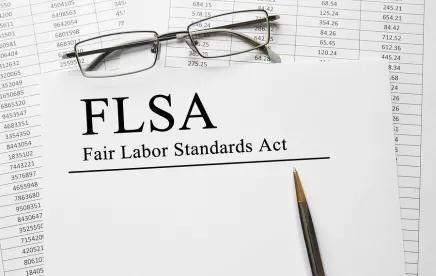Refusing to compensate employees for short breaks is prohibited by the FLSA, the Third Circuit has confirmed. Thus, an employer’s “flexible time” policy, under which employees were not paid if they logged off of their computers for more than 90 seconds, fails to comply with the Act when employees take breaks of twenty minutes or less, even if the policy allows the employee to log off whenever desired and for any length of time. Secretary, U.S. Dep’t of Labor v. American Future Systems, Inc., 2017 U.S. App. LEXIS 19991 (3rd Cir. Oct. 13, 2017).
American Future Systems publishes and distributes business publications and sells them through its sales representatives, who are paid an hourly wage and receive bonuses based on the number of sales they generate per hour while logged onto the company’s computer system. Under the company’s flexible time policy, the sales representatives are permitted to log off of their computers at any time, for any duration and for any reason. While the policy was intended to maximize employees’ freedom to take breaks as needed, because they are not paid if they log off for more than 90 seconds, in practice employees constantly face the dilemma of foregoing pay when taking brief breaks to, for example, use the rest room, fetch a cup of coffee or mentally recover from what may have been a demanding sales call.
The DOL brought suit against the company, asserting that the flexible time policy violated 29 C.F.R. § 785.18, which states that “[r]est periods of short duration, running from 5 minutes to 20 minutes . . . are customarily paid for as working time” and “must be counted as hours worked.” The district court agreed and granted the DOL’s motion for partial summary judgment in this respect. On appeal, the employer argued the time spent by sales employees logged off of their computers under the company’s flexible time policy does not constitute work and that the district court erred in adopting the bright-line short break rule embodied in Section 785.18.
Rejecting these arguments, the Third Circuit reaffirmed the longstanding FLSA regulation that, while the Act does not require an employer to provide employees with breaks (although several state laws do), if the employer chooses to do so, breaks lasting up to twenty minutes are considered compensable hours worked. The Court of Appeals was unpersuaded – and unamused – by the company’s semantic argument that the time at issue was “flexible time” and not a “break” as defined by the FLSA, noting that the protections of the Act “cannot be negated by employers’ characterizations that deprive employees of rights” to which they are entitled. The Third Circuit also rejected the employer’s argument that a fact-specific analysis should be applied to whether a short break is compensable under the FLSA and the DOL’s interpretive regulation. On the contrary, the Court of Appeals confirmed that Section 785.18 sets forth a bright-line rule for employers and to hold otherwise would establish a “burdensome and unworkable” administrative regimen.
American Future Systems is a caution to employers that neither the DOL nor the courts will abide by blatant efforts to circumvent the protections of the FLSA.




 />i
/>i

